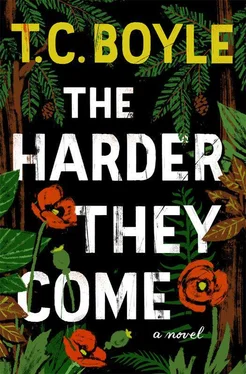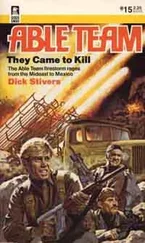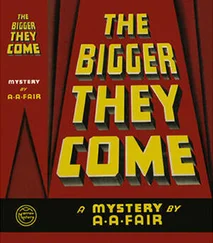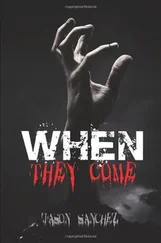He couldn’t picture that. Couldn’t picture the dreadlock dog in the house that was his private universe behind the eight-foot cement-block wall he’d built around it to keep them out, all of them, because the fact he kept trying to bury was that his father was selling the place to some alien and had already told him he had so many days from that day whatever day that was to clean up your crap and get out and I’m not going to tell you twice, which was why he’d set up the camp in the woods in the first place.
“No,” he said, “no,” and he was shaking his head. “She wouldn’t like it.”
JOHN COLTER WAS TWENTY-NINE, four years older than he was now, when he signed on with Lewis and Clark for the expedition to explore the Louisiana Purchase and open up the west. He’d been raised on the frontier in Kentucky, a wild place back then, more comfortable sleeping rough than in his own bed in the cabin he shared with his parents and his brothers and sisters and one uncle and his uncle’s wife, and if the other farmers’ sons were content to walk behind a plow, he wasn’t. He was a free agent from the earliest age, earning his keep by way of hunting, fishing and trapping, and in no need of a trail to carry him out or bring him home again either. As a child, he took to disappearing for days at a time, and then, as he got older and ran through his teens, for weeks, and no matter how far he roamed or in what territory, he was never lost, born with an uncanny ability to orient himself no matter where he was. He was like an animal in that regard, like a fox — or better yet, a wolf, an outlier with his nose to the wind.
Lewis and Clark took him on as scout and hunter, and while he left St. Louis with the expedition and stayed with it for more than two years, exploring the course of the Missouri River and going overland to the Columbia and ultimately the Pacific Ocean, he never made it back to civilization with the rest of them. It happened that on the return trip, while they were retracing their route through the Dakota country, a pair of trappers, heading west, stopped to camp with the expedition and tried to persuade Colter to come with them — he knew the country and they didn’t. He’d be their guide and their partner, three-way split. Plews were fetching ten dollars a head back in St. Louis, so it would be like stealing candy from a baby, easiest thing in the world, trap beaver and get rich — not that Colter cared about money much more than as a means to keep him in powder and balls, but the idea of staying in the country appealed to him. He went to Captain Clark for permission to muster out and he gave it to him, though there wasn’t a man in that company who didn’t think he was out of his mind, more than two years on the trail and civilization within reach — women, drink, clean sheets, news of the world and the celebrity that would come down to them all — and yet all that meant nothing to him. That was for other men, weaker men. He wanted to go out into the wilderness and take what was his and if anybody stood in his way, Cheyenne, Crow or Blackfoot, he’d take them too.
What became of the trappers, nobody knows, but at some point — a month in, two — Colter had got fed up with them, and who could blame him? Even with Lewis and Clark he was mostly on his own, out ahead of the expedition, breaking trail, hunting meat, camping solitary against the fastness of the night. The trappers — Joseph Dixon and Forrest Hancock — bickered, gave out with opinions, expected him to do things their way, two votes to one, as if setting traps and roasting beaver tail over a cottonwood fire was a democratic process. By spring of the following year — this would have been 1807—he was heading back down the Missouri in a canoe, his plews gone and stolen after a party of Blackfeet had surprised him. He had nothing to his name but his knife and rifle and a leather pouch with his powder, balls, flint and steel inside, and he had no destination either, though he had a vague notion of going back down to St. Louis just to see what would turn up.
He never made it. He ran into another expedition at the mouth of the Platte River — a conglomerate of fur traders under Manuel Lisa who were ambitious to set up a trading post — slash-fort — and he agreed to go on ahead, to go back, that is, and scout for them. His job this time was to contact the Crows in their scattered villages and spread the news about the trading post and how they could exchange furs for steel knives, mirrors, blankets, beads and baubles, which he did. In the process he became the first white man to discover what would become Yellowstone Park and managed to get himself shot in the right leg while fighting with the Crows against a party of Blackfeet. The Crows weren’t especially sympathetic or grateful either. They moved on and left him to his fate. But what kind of fate was that? Dying out there with a suppurating wound while the buzzards settled in for the feast? No, no way. Totally unacceptable. He wasn’t ready to leave this planet because he was too tough for that, too determined and resilient — and yes, independent — so he favored his good leg and walked three hundred miles back to the fort on the Platte.
This was what he knew, what the history books revealed, and if he closed his eyes while she sat beside him in the driver’s seat humming one of her lame country songs and the dog hung his head over the seat and breathed its meat-reeking breath in his face as the car yawed down Route 20 on the way to his place, he could picture how it must have been, Colter fighting down the pain till it went from something that filled him like an air pump inflating his skin to a hot white pinpoint of light that cooled with every step he took. Three hundred miles. Who could walk three hundred miles today, even on two good legs? Not to mention that Colter had no PowerBars or beef jerky or anything else, not even an apple, which people today took totally for granted as if apples were like air, and he had to forage all the way, subsisting on roots, frogs, snakes, the things he shot and feasted on only to leave what he couldn’t carry to rot when he moved on. That was legendary, that was a feat, but it was nothing compared to what came next — Colter’s Run, when he was naked and barefoot and a whole army of Blackfeet braves was chasing him down, all of them pissed-off and screaming and taking aim at his naked shoulders with their spears held high. He ran, and they chased him. And if he was faster than they were, even on their own ground and with their feet protected by moccasins, it was because he was John Colter and they weren’t.
He knew something was wrong the minute they turned into the dirt road and heard the distant discontinuous clanging as if the world were made of steel and coming apart at the seams. The windows were down. He’d been staring into the side mirror, staring into his own jolting eye and seeing the door panels fixed there like blistered skin and the dog slavering out the back and smearing the fender with a shiny outwardly radiating web of spit and mucus that immediately turned brown with flung-up dust when they went from pavement to dirt, and he wouldn’t look up. He wasn’t ready yet. He was listening to the tires, a clean spinning whine of perfect harmony on the blacktop that gave way to an angry thump and pop as they rocked over the washboard corrugations worked into the road to his grandmother’s house — to his house — because it was better than listening to her, to Sara, who kept trying to radicalize him against the government when he was already a thousand times more radical than she was. Nobody governed him. They were all just criminals anyway, every politician bought and sold by the special interests and the cops nothing more than their private army — he knew that and she didn’t have to tell him. But she did. On and on till her voice seemed to be coming from someplace other than her mouth and lips and larynx, as if it was riding radio waves on its own special channel.
Читать дальше












